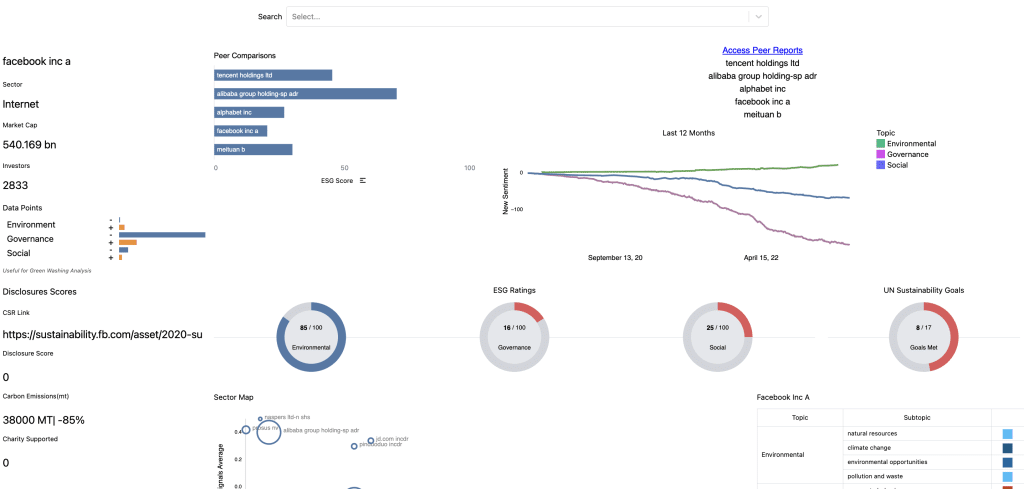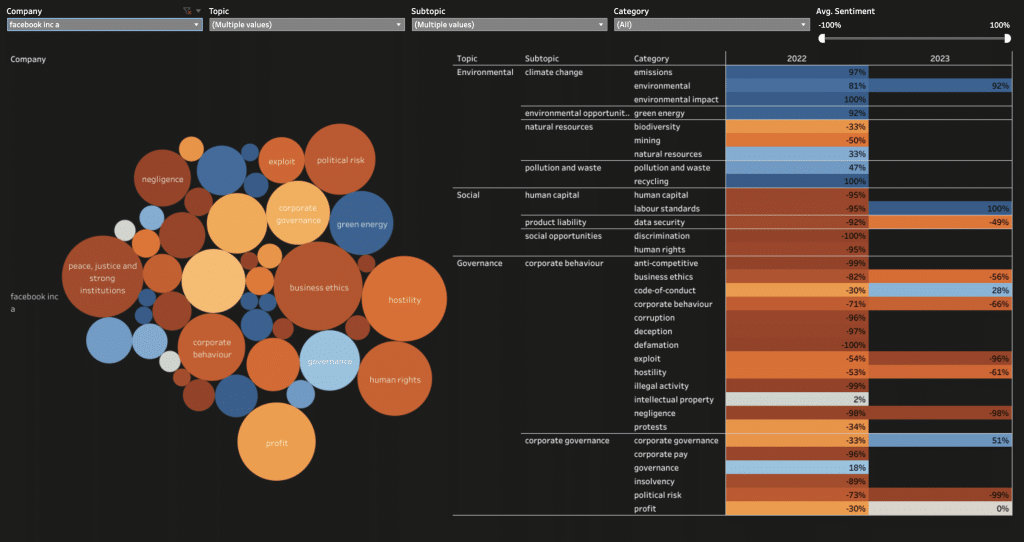Environmental, Social, and Governance (ESG) scores have become increasingly important in recent years as investors and consumers pay more attention to companies’ ethical and sustainable practices. But what exactly is an ESG score, and how does Facebook, now known as Meta Platforms, fare in this area? In this article, we will explore Meta’s ESG score and how it compares to other tech giants. Let’s dive into the fascinating world of ESG scores and see how Meta stacks up.
Meta’s ESG Score: A Closer Look
Meta Platforms, formerly known as Facebook, as one of the leading social media platforms, has a significant influence on society, the environment, and corporate governance. Its ESG score reflects how well the company performs in these areas and provides insights into potential risks and opportunities for investors. To understand Meta’s ESG score, we need to explore the factors that affect it.
Factors Affecting ESG Score
The ESG score comprises three main components: environmental, social, and governance factors.
Environmental
The environmental aspect of the ESG score focuses on a company’s impact on the environment, including its carbon footprint, waste management, and resource efficiency. To learn more about the importance of ESG disclosure and why it matters, check out this guide.
Social
The social component evaluates how a company treats its employees, customers, and communities. This includes factors such as diversity and inclusion, working conditions, and data privacy. For an in-depth look at creating a successful ESG strategy, read these 5 steps.
Governance
The governance aspect of the ESG score assesses a company’s leadership, transparency, and ethical practices. It also takes into account executive compensation, board diversity, and shareholder rights.
Meta’s ESG Performance
To understand Meta’s ESG score, we need to examine its performance in each of the three components.

Environmental Performance
Meta has made efforts to reduce its environmental impact by investing in renewable energy and setting ambitious goals to reach net-zero emissions by 2030. The company also reports its progress in its annual sustainability report.
Social Performance
While Meta has faced criticism for issues such as data privacy, misinformation, and its handling of hate speech, the company has implemented initiatives to improve its social performance. These include increased content moderation, investments in artificial intelligence to detect harmful content, and partnerships with fact-checking organizations.
Governance Performance
Meta’s governance performance is marked by efforts to increase transparency and accountability, including the establishment of the Oversight Board to make binding decisions on content moderation. However, critics argue that more needs to be done to ensure effective governance, particularly in terms of executive oversight and board independence.
Click here To access Meta’s full ESG report

Comparing ESG Scores
Meta vs. Other Tech Giants
Comparing Meta’s ESG score to other tech giants like Google, Apple, and Amazon reveals that the company is not an industry leader in terms of sustainability and ethical practices. While Meta has made some progress, it still lags behind its peers in certain areas, particularly in terms of social and governance performance. To see how Meta’s ESG score compares to other companies, visit Permutable AI’s ESG Reports for detailed information on companies like Apple, Microsoft, and Amazon.
Industry Average
In general, the tech industry has a mixed record when it comes to ESG scores. While some companies are recognised for their strong commitments to sustainability, diversity, and ethical governance, others face criticism for their environmental impact, labor practices, and data privacy concerns. As a result, Meta’s ESG score can be considered average when compared to the industry as a whole.
Improving Meta’s ESG
Meta’s Initiatives
Meta has taken several steps to improve its ESG performance in recent years, including the following:
Carbon Reduction
Meta is investing heavily in renewable energy projects and aims to have 100% of its operations powered by renewable energy. Additionally, the company is working to improve its energy efficiency and reduce its overall carbon footprint.
Community Investments
To address its social performance, Meta is investing in initiatives to support local communities, such as small business grants, digital literacy programs, and partnerships with nonprofits to promote social and economic development.
Transparency and Accountability
In response to concerns about the company’s governance, Meta has taken steps to increase transparency and accountability, including the creation of the Oversight Board and the release of regular transparency reports.
ESG scores and Public Sentiment

Conclusion
Meta’s ESG score reflects its mixed performance across environmental, social, and governance factors. While the company has made progress in some areas, it still has room for improvement, particularly when compared to other tech giants. By continuing to invest in sustainability, social responsibility, and ethical governance, Meta can enhance its ESG score and create long-term value for its stakeholders.
FAQs
What is an ESG score?
An ESG score evaluates a company’s performance in environmental, social, and governance aspects, providing insights into its sustainability and ethical practices.
Why is Meta’s ESG score important?
Meta’s ESG score is important because it helps investors and consumers understand the company’s commitment to ethical and sustainable practices, which can impact its long-term success and reputation.
How does Meta’s ESG score compare to other tech giants?
Compared to other tech giants like Google, Apple, and Amazon, Meta’s ESG score is average, with the company lagging behind its peers in certain areas, particularly in terms of social and governance performance.
What is Meta doing to improve its ESG score?
Meta is investing in renewable energy, community development initiatives, and increased transparency and accountability to improve its ESG performance.
Where can I find more information about Meta’s ESG performance?
You can find more information about Meta’s ESG performance in its annual sustainability report and through independent ESG rating agencies like Permutable AI.
By staying informed about ESG scores and their impact on companies like Meta, investors and consumers can make more informed decisions about where to put their money and which brands to support. Keep an eye on ESG trends and stay up to date with Permutable AI’s ESG Reports to ensure you’re making the most ethical and sustainable choices possible.
Looking for for ESG reports? Get in touch to request a look around our ESG dashboard and data sets!
